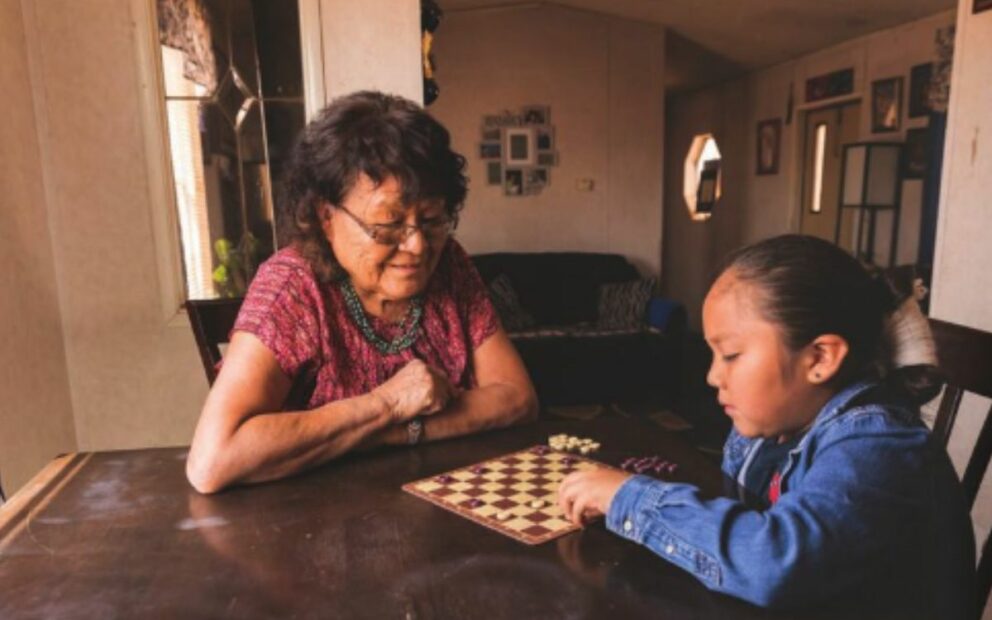Grandparents find Legal Aid in the community

Community Legal Clinics bring justice to clients where they live
Expecting the unexpected is not new for Sean and Nina Lewis*, but one thing they did not foresee was raising grandchildren in retirement. Sean, a member of the White Earth Band of the Chippewa, retired in 2018 from a long career as a special education teacher in Minneapolis. Nina, born on Leech Lake Reservation, was a Head Start teacher and later stayed home to care for the couple’s four children. In 1999, one son succumbed to meningitis at age seven. In 2017, another son died suddenly in adulthood, leaving behind two young children Katie and David*, and his wife, the children’s mother from whom he had been estranged.
Facing substance abuse issues, the Lewis’ daughter-in-law had left the family home years earlier. “Our grandkids didn’t have anybody else, so we kept them,” Nina explained. Sean and Nina became guardians, but soon faced obstacles providing for their grandchildren.
“We couldn’t do what we needed to do for them because we were only temporary guardians,” Nina explained. Without full custody, they couldn’t access benefits like Social Security to which the children were entitled. Even the basics of caregiving like trips to the dentist or doctor became difficult as the mother’s signature was sometimes required, and she was hard to reach.
Barriers to Custody
What Sean and Nina needed was permanent custody but navigating the process wasn’t easy. Sean struggled to fill out the paperwork. “I didn’t know what to do,” he said.
As it happened, the couple found help nearby when they joined a support group for grandparents raising grandchildren at the Division of Indian Work (DIW), an organization serving the urban American Indian community, located on East Lake Street in Minneapolis.
“The group was for grandparents like us whose kids were on drugs or had passed, like ours.” Nina recalls, “None of us wanted our grandkids to go into foster care, so we grandparents were taking care of them.”
Through the group, Sean and Nina discovered both kindred spirits and a path, just steps away, to expert help at the legal aid clinic on-site at DIW.
Clinic History
In the spring of 2022, Mid-Minnesota Legal Aid (MMLA) opened a law clinic–one of five throughout Minneapolis–in partnership with DIW. In proximity to clients who might not otherwise have access to attorneys, MMLA offers free legal advice and representation to members of the community with limited incomes and those 60 years of age and older. Attorneys assist with a wide range of legal issues such as child custody, eviction, and benefit assistance.
Joe Hamaker joined the clinic as staff attorney in August of 2022. Sean and Nina were among his first clients. “Sean and Nina rose to the occasion when the kids needed them most,” Joe said. “They did a good job, but the law isn’t really set up to handle custody in an easy way.”
The Lewis’ case illustrates why MMLA has established community clinics. Hamaker was able to zero in on what the clients needed, when they needed it. “They had a clear and compelling case under the law, but they weren’t able to get it done without legal help,” he said.
“Sean and Nina rose to the occasion when the kids needed them most. They did a good job, but the law isn’t really set up to handle custody in an easy way.”
Attorney, Joe Hamaker
He helped the couple to draft and file a petition for custody. With the mother’s cooperation, they filed a stipulated order that granted permanent custody of the children. As a result, Sean and Nina avoided going through an arduous, lengthy trial.
Access to Justice
“Joe rolled up his sleeves and did the paperwork for us,” Sean recalled. “It was very easy. We’d meet with him to give him information, he’d let us know what we needed to do and we’d go do it.”
“We felt good when it was all resolved,” Sean said. Nina concurs. “But I felt bad for the kids’ mom,” she said. “We’d given her all this time to get her act together and care for the kids, but she never did. It was time for us to do what was best for the children.”
Since the ruling, Sean and Nina have been able to do more to care for Katie and David. Third grader Katie has autism spectrum disorder and Sean and Nina are now able to work with Katie’s school to access special education services for her. Sean and Nina are homeschooling teenage David because early childhood experiences created difficulties for him in a school setting. Both children still see their mother from time to time with worry erased about instability of guardianship.
“We’re doing a lot now trying to give them a good life,” Nina said. “And we wouldn’t have it any other way.”
Hamaker was pleased to help guide his clients through the process. “I was really proud that we were able to help them vindicate their rights under the law that were out of their reach,” he said.
Partnerships and Referrals
“Having Legal Aid at DIW is a gamechanger,” said Louise Matson, executive director of the Division of Indian Work. “The American Indian community often encounters barriers to legal help ranging from intimidating paperwork to the high cost of legal fees. The on-site clinic removes those barriers. It’s a true win-win situation for our community and our mission.”
Sean and Nina have already recommended Legal Aid’s clinic at DIW to other people in their situation. “Without help from Legal Aid, I would have had to borrow money to go find legal help,” Sean explained. “We couldn’t have afforded that.”
“One of my friends had trouble trying to get custody of her granddaughter, so I told her to go over there and see Joe,” Nina shared. “She did, and she’s really happy now.”
*names changed to protect client identity

